How to Breakthrough Your Poverty Mindset: Money is No Object
This week, a Georgetown University study was published that concluded that wealth, not ability, is the biggest predictor of future success.
While that may not be a mind-blowing revelation, it does lead to some interesting ideas for turning the tide in the (im)balance of the haves v have-nots.
An article summarizing the study closes with this paragraph:
(Anthony) Carnevale and his team recommend states operate robust preschools with ongoing interventions, as well as improved counseling and career exploration programs, to help solve this complex problem.
Sure, OK, yes…states can intervene. Counseling and career exploration can be presented, but let’s dig a little deeper.
What’s under this study? What is the common element of the haves and the have nots?
Mindset.
In the way the article is written, it appears to be a death-knell for the dreams of those who come from limited financial circumstances. If that is your background, do you read this article and think, “Why should I bother? The deck is stacked against me.”
That is a limiting belief. That is a negative mindset.
Hold that thought…No, not the limiting thought, just the awareness of it.
As the article concludes, it appears to be the opinion of the author and the study’s co-author (Anthony Carnevale) that only outside intervention from the government can shift the outcomes.
So, I ask you, how is it empowering individuals to achieve their goals if they are being told that the problem is too big and they need the assistance of the government to get ahead?
What purpose is that serving? The purpose of empowering the government to be the go-to problem solver; the purpose of keeping individual disempowered.
That is not creating personal empowerment. That is not enabling personal freedom.
And it pisses me off.
But I digress.
On the same day that the story of the Georgetown study broke, another college-related story was highlighted.
Billionaire Robert Smith, speaking at Morehouse College’s graduation, promised to a pay off the student loan debt of the graduating class; an estimated $40 million.
Be sure to watch the video from NBC’s Today show (linked above) in its entirety. It’s just under two minutes long.
His speech is inspiring, the message and energy of his generosity is uplifting. As a viewer, you can feel the relief of the students.
Yet, how does NBC choose to close the story?
With a focus on the “student debt crisis.”
By focusing back on the problem, NBC leaves viewers disempowered with images of students buying groceries and a promise of further exploration into the “crisis.”
Robert Smith’s message of empowerment is lost and forgotten in a mere 20 seconds.
How much more powerful would that segment have been if the crisis was introduced first, to frame the issue, and then Smith’s generosity presented as a counterpoint, a hopeful, inspiring, and empowering message to have viewers remember?
Remember the Law of Experience?
Quick summary: The last thing you experience in an event is what you remember about the event.
NBC just reinforced the concept that students are, and have to, struggle under a load of debt.
Side note: If you are of the sarcastically minded who say, “Hey, you complained that government intervention is disempowering, so why isn’t Smith’s intervention disempowering too?”
The answer is simple: Smith’s intervention was a gift. The students didn’t ask for it. They did not expect it.
Rather than experiencing a program that may have limited their resourcefulness, they experienced relief.
It’s Time to Break Disempowering Money Beliefs
For Robert Smith, the money required to pay off the class’ student debt was no object.
$40 million is 0.8% of his estimated worth.
Look at that phrase again, “money is no object.”
The phrase, “Money is no object” has been used typically as a snide remark toward the abundance of others: LINK
“Oh, of course they went on a cruise, money’s no object for them.”
“She’ll be fine. She can afford it. Money’s no object for her.”
“He’ll just buy his way out of it. Money’s no object for him.”
Basically, it’s a way to describe rich assholes flaunting their success.
When individuals with a poverty mindset use these words, they tend to direct the idea toward those who have an abundance of finances, those who are willing (and able) to spend seemingly exorbitant amounts of money on seemingly frivolous things.
They are in essence saying, “While money is no object for them, it is for me, because I disagree with their spending choices and am envious of their financial freedom.”
If this sentiment resonates with you, it’s time to grow up. You are blocking your own financial success.
Money really is NO OBJECT
Guess what? Money isn’t an object. It is a concept.
It is a culturally agreed-upon method of exchange for goods and services.
In his wonderful run on the DC comic Doom Patrol, writer Grant Morrison brought this idea to the page very clearly.
Doom Patrol series actor Alan Tudyk describes the idea in an interview here.
In essence, Morrison’s presentation goes something like this:
If I held up a dollar and asked you what it was worth, what would you say?
What if I then told you it was a counterfeit? Now how much is it worth?
What if I told the counterfeit was made by Picasso?
What if I told you that was a counterfeit?
What if I told you the Picasso counterfeit was made by Dali?
And on and on it goes…
In Morrison’s example, the same piece of paper moves from the value of $1 to $0, to millions, to $0, back to millions, and on, and on, and on. THE SAME PIECE OF PAPER - only the ideas about it changed.
We perceive the value of an item based upon what we know about it, or what service it brings to us, particularly in time of need.
We’ll gladly pay more to relieve the pain from a breakdown than we will for maintenance on our bodies or cars.
When we say things like, “It’s too expensive,” or “I can’t afford it,” we are turning money into an object. It becomes a thing that prevents us from achieving or attaining something that we want.
Worse, it moves beyond being just an object, it becomes an obstacle.
Tying this concept back to the Georgetown study, what do you suppose is the mindset and experience of the affluent students with low grades? Their experience of money is empowering. They grew up learning that money was no object and that it was relatively easy to attain and hold onto.
The experience of the students who show more ability, but are lower on the economic scale? Their money experience is disempowering. They probably grew up learning that money was difficult to gain and that there was never enough to go around.
The mindsets of both groups were learned, reinforced by experience, and became a belief that they lived as a tangible expression of their self-value.
This is where I find fault with the conclusion of the Georgetown study.
Yes, state program interventions, counseling, and career programs may help shift outcomes, but if the students from the lower-end of the economic scale do not change their money-mindset, they will not achieve the same results as those with a success-mindset.
Their limiting beliefs will still get in the way no matter how much outside aid is available.
Overcoming the Obstacle
Alan Watts explained, what would you do if money were no object?
The idea of pursuing a career just for the money associated with it is a fool’s journey.
Those who take this journey are chasing an intangible idea, not an outcome. Many times, they are undertaking a career that is in conflict with their life’s passion and purpose.
And they wind up miserable, burned-out, frustrated, and angry.
When we give ourselves permission to follow our dreams, living our purpose, we then live a happier life. The money will come. It may not be immediate, but it will come.
And you know what? While the money is en route, your life will be much more enjoyable because you are expressing your purpose.
The 2019 graduating class of Morehouse has received an amazing gift. They, as noted in the NBC News story, are free to pursue their passions in life.
It’s time for you to do the same.
I’ve said frequently in these articles that we are nothing more than the stories we tell about who we are.
If you have a disempowering money story, let’s change it.
Step one: Realize that your limiting beliefs around money are just ideas. They are not real.
Step two: Ask yourself, “What do I want my new relationship with money to be?”
Step three: Start living your new story.
Are you ready?
Sign up here to breakthrough your old money story.
Take action now, because now you know, money is no object.

